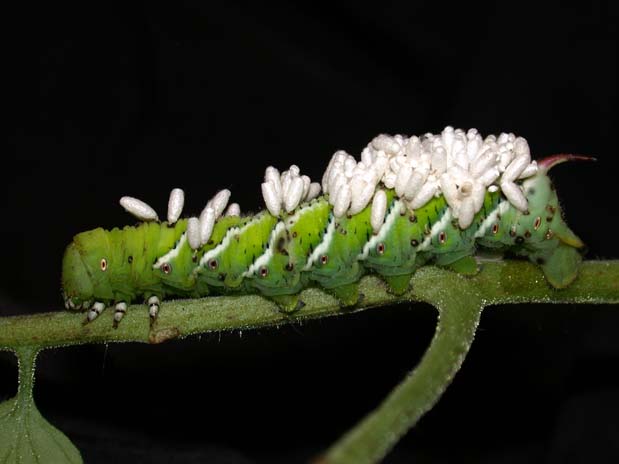

|
|
Parasitic Wasp larva
(John Obermeyer, Purdue University) |
|
Common Name: Parasitic Wasp - larva
See also: adult | benefit Scientific Name: Braconidae and Ichneumonidae: several species Status: beneficial parasitoid Beneficial Stage: larval Biology: The term “parasitic wasps” refers to a large group of hymenopterans that are parasitic on other arthropods. Parasitoid wasps are very diverse in their sizes, biology, life cycles, and the hosts that they infest. The smallest known insects are parasitic wasps called fairyflies. These are less than 1/50 inch and live entirely inside the eggs of another insect. At the opposite extreme, some Ichneumonid wasps parasitize large grubs or wood borers and may be more than 3 inches long. Two parasitic wasp families in particular, Braconidae and Ichneumonidae, are considered to be very beneficial to agriculture because they lay their eggs on the bodies of pest insects (hosts), and when the eggs hatch, the larvae consume the hosts from the inside. By the time that these parasitoids complete development, the host insect is dead and the wasps emerge to seek another host. Most are small wasps, ranging in size from 1/10 to 1/2 inch in length. Braconids, as a group, are usually smaller than Ichneumonids, but both are normally black or brown in color, and some have yellow, orange, or red accents. They have very long antennae, and the ovipositor is also long and readily apparent. Parasitic wasps are best known for their control of caterpillars. However, they also infest flies, sawflies, wood-boring beetles, weevils, leafmining insects, true bugs, and ants. The generation time of most parasitic wasps is relatively short, often in the range of ten to thirty days. Many larvae form a silken cocoon on the outside of the insect carcass. |
 |
||||||||||||||||
|
|
|||||||||||||||
|
Purdue Extension Entomology, 901 West State Street, West Lafayette, IN 47907 USA, (765) 494-4554 Department of Entomology | College of Agriculture | Extension © Purdue University | An equal access/equal opportunity university | Integrity Statement | Copyright Complaints | Maintained by ENTM IT Trouble with this page? Disability-related accessibility issue? Please contact us at entmwebmaster@purdue.edu so we can help. | ||||||||||||||||
